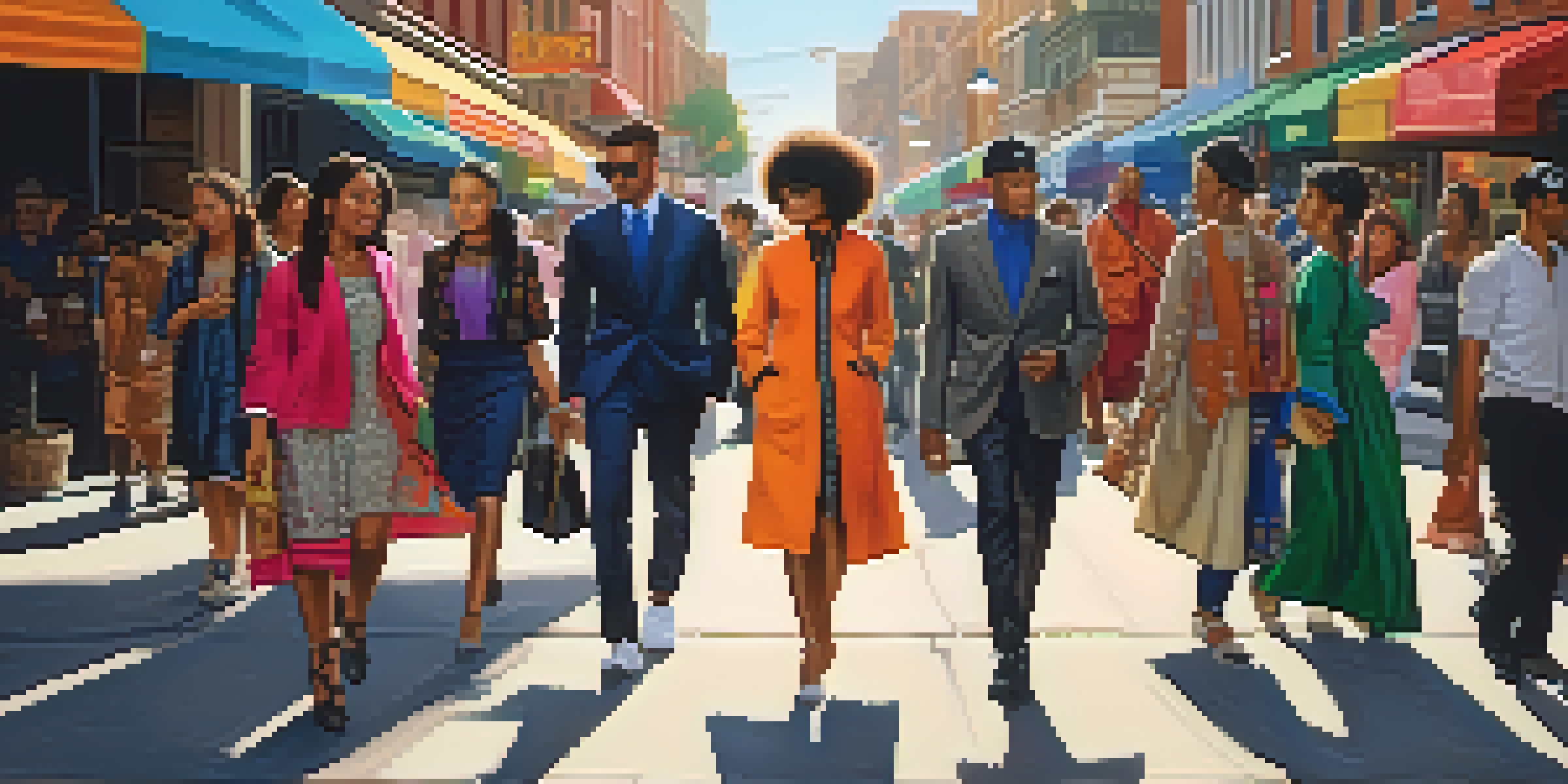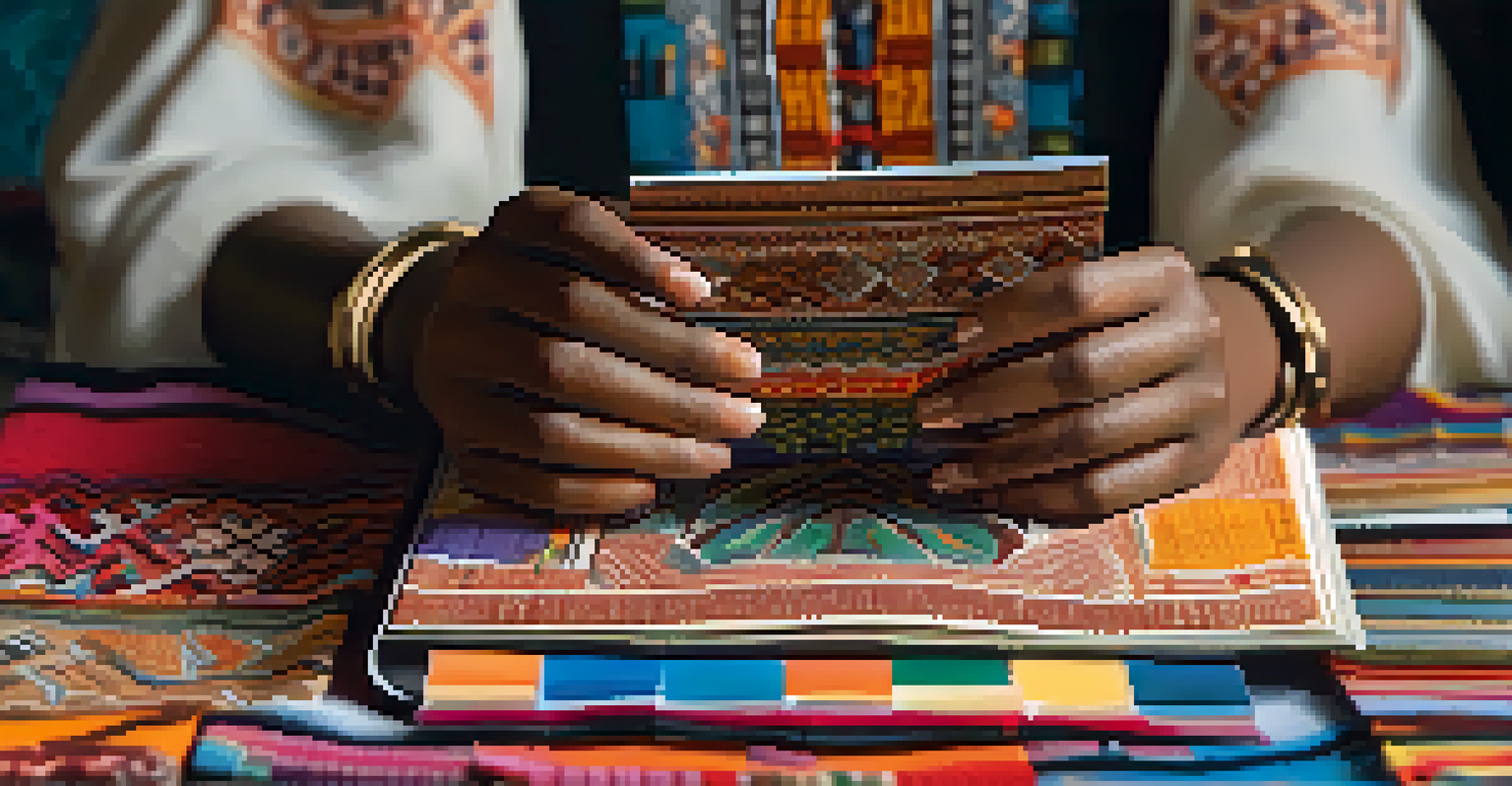Fashion Icons: Globalization's Role in Popularizing Styles

Understanding Globalization and Fashion
Globalization is the process that connects countries and cultures through trade, communication, and technology. This phenomenon has a significant impact on fashion, as it allows styles and trends to cross borders at an unprecedented pace. For instance, a street style trend from Tokyo can influence fashion weeks in Paris and New York almost overnight, showcasing the interconnectedness of global fashion.
Fashion is the armor to survive the reality of everyday life.
As fashion becomes more globalized, it's essential to recognize how cultural exchanges enrich our wardrobe choices. Designers draw inspiration from diverse cultures, leading to unique fusions of style that celebrate global diversity. This merging of aesthetics not only broadens the fashion landscape but also promotes cultural appreciation, rather than appropriation.
However, with this rapid exchange comes the challenge of maintaining authenticity. As styles become popularized worldwide, it's crucial to honor their origins and the stories behind them. Recognizing the roots of these trends can foster a deeper connection to fashion and its cultural significance.
The Role of Fashion Icons in Global Trends
Fashion icons play a pivotal role in shaping global trends and popularizing styles. These individuals, whether they’re celebrities, designers, or influencers, have the power to influence public perception of fashion. For example, when a celebrity sports a particular designer or style, it often leads to a surge in popularity and demand for those pieces, demonstrating the ripple effect of their choices.

Moreover, fashion icons often embody cultural movements and social issues, making their styles resonate on a deeper level. Think of how the rise of body positivity has led to a diverse representation of models and styles in the industry. Icons who promote inclusivity not only challenge traditional beauty standards but also inspire a new generation to express their individuality through fashion.
Globalization Shapes Fashion Trends
Globalization facilitates the rapid exchange of fashion styles and cultural influences, enriching our wardrobe choices.
The intersection of celebrity culture and globalization means that fashion icons can now reach audiences worldwide with just a single post on social media. This instant access to style inspiration allows for a more democratized fashion landscape, where anyone can become a trendsetter, regardless of their background or location.
Influence of Social Media on Fashion Popularity
Social media has revolutionized the way we consume and engage with fashion. Platforms like Instagram, TikTok, and Pinterest allow users to share their personal styles and discover trends from around the globe. This visual storytelling has made fashion more accessible, enabling anyone to participate in the conversation, regardless of their geographical location.
Fashion is about dreaming and making other people dream.
Influencers have emerged as key players in this space, often acting as fashion curators who spotlight emerging trends. Their ability to connect with audiences on a personal level makes them powerful advocates for brands and styles. A simple outfit post can launch a trend, proving just how influential social media can be in the fashion industry.
However, this constant stream of fashion content can also create pressure to keep up with trends. As styles evolve rapidly online, consumers may feel overwhelmed by the need to stay relevant. It's important to strike a balance between following trends and cultivating a personal style that reflects one's identity.
Cultural Exchange and Its Fashion Implications
Cultural exchange is a vital component of globalization that significantly impacts fashion. It allows for the sharing of traditional garments, techniques, and motifs that can be reinterpreted in contemporary designs. For example, the incorporation of African prints into Western fashion has led to a beautiful fusion of styles that celebrate diversity and creativity.
This exchange not only enriches the fashion narrative but also promotes cross-cultural dialogue. By showcasing diverse styles, designers and brands can foster a greater understanding of different cultures and their aesthetic values. This cultural appreciation can lead to innovative designs that resonate with a global audience.
Social Media's Fashion Influence
Social media platforms empower influencers and consumers alike, making fashion more accessible and democratized.
However, it's crucial to approach cultural exchange with sensitivity and respect to avoid appropriation. Fashion brands must strive to honor the origins of the styles they incorporate, ensuring that they acknowledge and celebrate the cultures from which they draw inspiration.
Sustainable Fashion in a Globalized World
As globalization spreads, so does the conversation around sustainable fashion. With the fast-paced nature of trends, the fashion industry faces challenges related to overproduction and waste. Consumers are becoming increasingly aware of the environmental impacts of their fashion choices, leading to a demand for more sustainable practices.
Brands are now finding ways to adapt by incorporating eco-friendly materials, ethical labor practices, and upcycling techniques. This shift not only addresses environmental concerns but also appeals to a conscious consumer base that values transparency and sustainability. When fashion icons advocate for sustainable brands, it amplifies the message and encourages more people to make informed choices.
Ultimately, the globalization of fashion can serve as a powerful platform for promoting sustainability. By collaborating across borders and sharing innovative practices, the industry can work towards a more responsible future, ensuring that fashion remains both stylish and sustainable.
The Impact of Fashion Weeks on Global Trends
Fashion weeks across the globe serve as pivotal events for setting trends and showcasing new styles. Major cities like New York, Paris, London, and Milan attract designers, influencers, and fashion lovers, creating a melting pot of ideas and inspiration. These events not only highlight the latest collections but also reflect broader cultural and social themes that resonate with audiences worldwide.
As trends emerge from these fashion weeks, they are quickly disseminated through media coverage and social media platforms, allowing them to reach a global audience almost instantly. A standout collection or unique runway presentation can ignite interest and influence fashion choices across continents, showcasing the power of these events in shaping global style narratives.
Sustainability in Global Fashion
The fashion industry is increasingly adopting sustainable practices to address environmental concerns and cater to conscious consumers.
However, the fast-paced nature of fashion weeks can also lead to a cycle of rapid consumption. The challenge lies in finding a balance between showcasing creativity and promoting sustainable practices within the industry. Designers and brands must consider the long-term implications of their collections and strive for a more thoughtful approach to fashion.
The Future of Fashion in a Globalized Context
Looking ahead, the future of fashion in a globalized context holds exciting possibilities. With technology continuing to evolve, we can expect even more innovative ways to connect cultures and styles. Virtual reality fashion shows and augmented reality shopping experiences are just a glimpse of how technology will further enhance the global fashion landscape.
The growing emphasis on inclusivity and diversity will likely shape future trends as well. As consumers demand representation and authenticity, brands will need to adapt to reflect the diverse voices and stories that make up our global society. This shift creates opportunities for new designers and perspectives to emerge, enriching the fashion world.

Ultimately, globalization will continue to play a significant role in popularizing styles, but with an increasing focus on sustainability and cultural sensitivity. As the industry evolves, it will be essential for fashion to embrace these values, ensuring that it remains a vibrant and respectful reflection of our interconnected world.